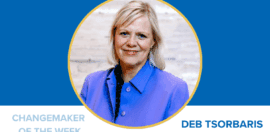Giving Disability Carers a Break - Report
6 May 2014 at 12:29 pm
Disability carers are extremely resilient and resourceful, but their mental and physical well-being would decline significantly if support services disappeared or were diminished, a new Not for Profit report has found.
The finding comes in a new 60-page Wesley Mission report called Giving disability carers a break. The results are from a survey and interviews with disability carers in January this year.
The Wesley Report provides a snapshot of life as a carer of someone with disability; the commitment, the concerns, the joys, and the challenges.
“The reality is that this role is hugely taxing and takes its toll on even the most robust, loving people,” the CEO of Wesley Mission, the Reverend Dr Keith Garner, said.
“We discovered that carers of people with disability are incredibly compassionate and resilient. Their capacity to overcome adversity and rise to continual challenges is remarkable.”
The survey asked carers to consider the impact if the services they receive were absent. Across all aspects measured (social, emotional and financial), carers indicated that they would be considerably less satisfied without the provision of care services.
Some 82 per cent of respondents in the survey indicated that their level of satisfaction with their mental health would decline without the provision of care services. Some 71 per cent said the level of stress in their lives would worsen if services were reduced.
More than half of all those surveyed indicated that they would be less satisfied with their physical health if services were not provided, and 67 per cent said that they would be dissatisfied with the impact on their personal time if services were not provided.
“While the implementation of the NDIS and a renewed focus on person-centred care is designed to better tailor services to the needs of the individual, the provision of disability support outside the NDIS is still essential to assist both carers of people with disability and the individuals themselves,” Dr Garner said.
“Understanding the impacts of disability service access for individuals and their families is critical to ensuring that services remain relevant in meeting the needs of people with a disability and their carers.”
Key findings of the Wesley Report:
· life is extremely complex and stressful for carers. The research showed that almost all carers interviewed were caring for a number of individuals, and had personal health issues, relationship concerns and/or mental health complications. Carers are exposed to a range of stressors across a number of areas, leaving them highly susceptible to breakdown;
· any sense of self is compressed—the lifestyle of carers is completely focused on and dedicated to the wellbeing of those they care for, resulting in them putting themselves in ‘second place’;
· there’s not enough time—the complexity of combining caring responsibilities with non-caring responsibilities, and the challenge of fitting work commitments around caring, left carers feeling there was limited time in the day to do all they needed to they are concerned for the future of those in their care—carers expressed high levels of concerns in relation to the future, particularly in regard to securing a meaningful and safe future for those they care for;
· despite all the stress, carers are very resilient— while stress, strain and sacrifice are all part of caring for someone with disability, carers showed a determination to provide the best care they could.
More than half of all carers indicated that they would be less satisfied with their physical health if services were not provided, and 67 per cent said that they would be dissatisfied with the impact on their personal time if services were not provided.
At a total level, satisfaction with physical health declines significantly from 50 per cent where carers are ‘very satisfied’ or ‘satisfied’ under the current service provision arrangements to a predicted 23 per cent if services were restricted.
Wesley Mission says it also wanted to find out what the financial impact would be on carers if services were diminished. The study also found that that there is a relationship between financial stability and capacity and the ability to access disability care services.
“Carers felt that a reduction in services would have a negative impact on their financial situation,” Dr Garner said.
Forty-five per cent of carers were either ‘very satisfied’ or ‘satisfied’ that they could save money under current service provisions but when these services were taken away this optimism declined to just 20 per cent.
“What was also clear was that caring for someone with disability, and the benefits of accessing disability care services, had a significant impact on the ability for carers to engage in the labour market. There was a clear link between getting flexible support services and the ability of carer to return to the workforce or to pursue career options,” Dr Garner said.
“Beyond the financial benefits of employment, carers interviewed for the study indicated that work gives satisfaction in life—many were not looking forward to becoming a full-time carer, even though this could make their lives easier.
“The level of disability in the community is telling: one-third of all Australian households include a person with a disability, 4.2 million Australians have a disability while 2.7 million provide informal care to people with a disability. Twenty-nine per cent of these people are primary carers,” he said.
Wesley Mission provides disability services and works closely with people with a disability and their carers.







